Netherlands v England: How the Dutch responded to their national team 'crisis'
- Published
- comments

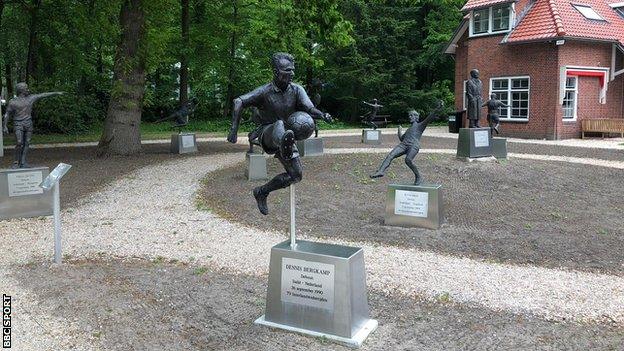
Dennis Bergkamp depicted controlling the ball outside KNVB headquarters in Zeist
Thirty-five miles south of Amsterdam, in the forest-like setting of Zeist, sits the home of Dutch football.
The peaceful, tree-lined site is dusted with nods to former greats. Statues of Netherlands legends stand proudly outside a main building whose walls carry inspiring quotes from Johan Cruyff, the football revolutionary who died in 2016.
"Playing football is very simple, but playing simple football is the hardest thing there is."
Cruyff principles remain central here at the national team's training complex, his legacy complemented by state-of-the-art facilities.
During international duty, the country's top professionals will cycle the short distance from team hotel to training pitches, passing the innovative medical centre and gym. High-tech recovery equipment, indoor running tracks and virtual reality headsets geared to improve decision making lie in wait.
Even in less busy times, Netherlands manager Ronald Koeman usually makes the 25-minute trip from his nearby home twice a week - when he is not scouting players or watching games - to plan training sessions and analyse upcoming opponents.
On this mild, overcast Monday in May, Koeman arrives brimming with pride. He is delighted to have recently become a grandfather.
On the professional front, he has been busy finalising plans to beat England in Thursday's Nations League semi-final. The 56-year-old is enjoying life after the day-to-day pressures of four years in the Premier League with Southampton and Everton.
Taking pride in representing your nation was one of Koeman's key messages to players on his first day in the job 16 months ago, a tenure that began with a 1-0 friendly defeat by Gareth Southgate's side.
"You are defending the colours of your country," he says amid the orange jerseys hanging from the meeting room walls behind him.
He lets slip a wry smile when the statues are mentioned. The European Championship-winning coach Rinus Michels is immortalised, Ruud Gullit is depicted hoisting the trophy aloft and Marco van Basten is caught mid-flight but, despite being a key member of that 1988 team - the only Netherlands side to win a major tournament - Koeman is yet to be cast in bronze.
Koeman openly admits he would not rank winning the inaugural Nations League alongside the achievements of '88. But topping a group containing world champions France and Germany to reach this stage is a sign the Dutch are mounting a strong revival after a turbulent five years.

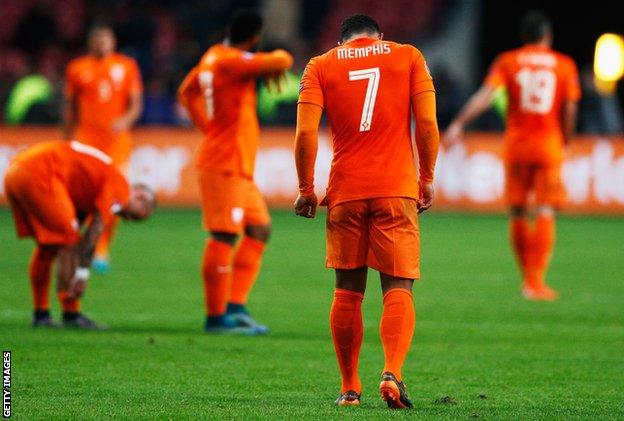
Netherlands finished fourth behind Czech Republic, Iceland and Turkey in their Euro 2016 qualifying campaign
Since Louis van Gaal's side finished third at the 2014 World Cup, beaten on penalties by Argentina in the semi-finals, the Netherlands have failed to qualify for back-to-back major tournaments and have parted company with four managers.
There was already a sense in 2014 that Van Gaal, during his second stint with the national team, had overachieved with the players available thanks to a disciplined, organised approach.
Frank de Boer was Ajax boss at the time and, with a number of his side involved, he watched on intently.
"Van Gaal did a great job to put five in the back because he knew, 'OK, we are defensively not strong enough'," he says.
"We had the quality up front with Robin van Persie and especially Arjen Robben. They made the difference in 2014, with Wesley Sneijder delivering the pass to them."
Why the feel-good factor is back in the Netherlands
Following Van Gaal's departure for Manchester United after the tournament, the Dutch turned to Guus Hiddink. He did not last 12 months before resigning and was replaced by assistant Danny Blind as the country missed out on qualification for the European Championship for the first time in 32 years.
Blind was unable to turn that poor form around heading into qualification for the 2018 World Cup and Dick Advocaat failed to stop the slide as a Netherlands side caught in transition were again notable absentees at a major tournament. This from a country that had reached the World Cup final in 2010 - when De Boer was assistant manager.
"Rafael van der Vaart, Sneijder... they left a gap," explains De Boer, who is now in charge of MLS side Atlanta United.
"You have to put young, fresh guys in but at that moment they weren't ready - they were still 17 or 18 years old.
"Everyone wants to qualify, but a small country like us always has periods where we don't have that much talent. Sometimes you have to fall a bit deep to come back stronger."
It sparked a post-mortem among the Dutch media.
"They spoke about crisis. People were saying: 'We need to change the system and we need to learn from Germany and we need to learn from Belgium,'" says Koeman. "But that's football."
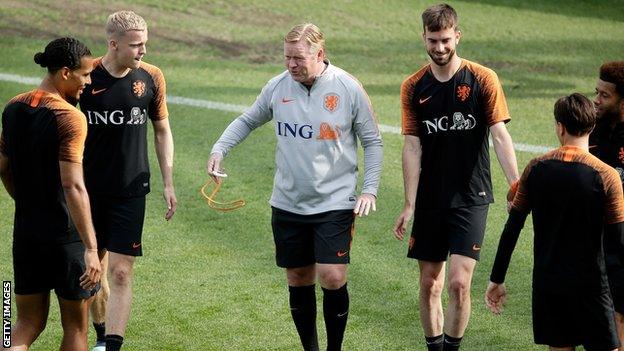
Koeman was Southampton manager when Van Dijk arrived from Celtic for £13m, in September 2015
The new manager's arrival proved timely. Future established names such as Liverpool defender Virgil van Dijk were beginning to flourish while a generation of young, talented players were emerging at Ajax.
Koeman recognised a need for more intensity in training sessions and called on his side to improve defensively, while stressing the need to keep the Dutch "identity".
"We are people in Holland that are creative, also in football, and the technique of players is the base of our football," adds Koeman, who won 78 caps for his country.
"It's about the quality, it's not about defending, it's not about Catenaccio - it's play to win and that style we need to keep."
Koeman handed the captain's armband to Van Dijk, a player he signed as Southampton manager in 2015, and set about experimenting with systems that would eventually see the 27-year-old partnered by Ajax's teenage sensation Matthijs de Ligt in a back four for their Nations League opener.
In September last year, the Dutch were beaten 2-1 by France, but Van Dijk and De Ligt had done enough to convince Koeman he had one of the best central defensive partnerships in the world.
"You always build the house from downstairs," he says. "You don't start with the roof.
"When you look at Virgil now, this is a big, big personality on the pitch. He is strong, he has a great character and enjoys the responsibility."
De Boer, who won 112 caps in the heart of the Netherlands defence, is also impressed by the PFA Player of the Year.
"He has so much confidence it is unbelievable," says the 49-year-old.
"He is a leader in the defence and also outside the field, it gives the other players confidence."
De Ligt, meanwhile, was almost a ready-made star. The Ajax captain made his international debut at 17 - the youngest player in more than 80 years.
"If you watch him play, you do not see a player who is only 19," says Koeman. "You see a player who plays with so much more experience than he actually has."
De Boer adds: "He has got everything: speed, good technique, he can build up from behind, he's a fantastic defender. It's unbelievable what he's already done."
De Ligt and Van Dijk form a solid base in the spine of a side that in midfield includes Barcelona-bound Frenkie de Jong and Liverpool's Georginio Wijnaldum, with Ryan Babel and Lyon's Memphis Depay in attack.
Babel, a free agent since leaving Fulham at the end of the season, says Koeman has given the national side a clear vision and knows "exactly what type of players he wants" in each position.
"Most importantly, everybody takes their responsibility and knows what is required to play on the top level," says the 32-year-old, who was given his senior debut at Ajax by Koeman 15 years ago.
Three of that core - Van Dijk, Depay and Wijnaldum - were on the scoresheet when the Netherlands defeated Germany 3-0 at home in their second Nations League outing. They would go on to also beat France 2-0, before scoring twice in the final five minutes to draw with the Germans in Gelsenkirchen. That set up their knockout meeting with England.
"The most important was the first match, away against France," says Koeman. "We lost 2-1 in the end. But in that game, against the world champions, we got the feeling we can beat them. That we can play on this high level.
"The atmosphere around the national team has changed. That is down to the players and how we started in the Nations League."

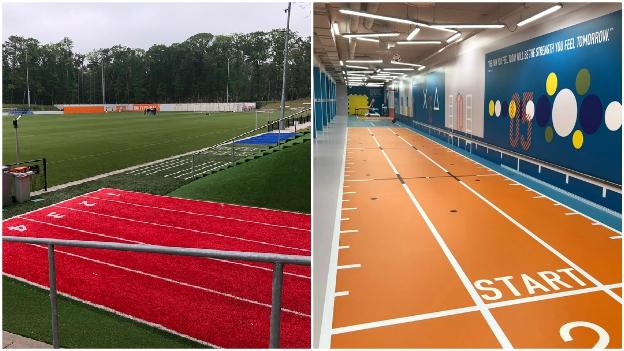
The KNVB campus opened on 1 September 2016
Outside the KNVB (Dutch FA) campus, students walk the artificial pitch toying with potential new rules - how would rolling substitutes or new free-kick guidelines work? The place screams with imagination, emboldening KNVB employees to embrace the same principles that coaching staff look to instil in the nation's young players.
At youth level, around 60 national team hopefuls will train at each age group, allowing staff the chance to work with smaller players or those who might be late developers, while the most talented are selected for tournament squads.
"What we especially look for is creativity and intrinsic motivation," says director of football development Art Langeler.
"We are couriers. We expect guys to ask why they are doing things. The Dutch way of coaching is always to lay the responsibility with the players."
Langeler has been all over the world but is yet to discover a similar model. He feels Dutch youngsters are not better skilled or more athletic than in other countries but "have their own minds".
"Sometimes it's difficult because the guys are going to annoy by asking every time 'why this, why that?', but it grows a self-educated player who is self-responsible," adds the former PSV academy director.
It seems to be working. The day before our meeting, the Netherlands retained their Under-17 European Championship title, while graduate De Jong - someone Langeler says, as a late bloomer, would have been in the wider talent pool - is now an integral part of the senior team and will join Barcelona from Ajax for £65m this summer.
"At 14, 15, 16, he was still a little guy," explains Langeler, who says PSV were keen to sign the midfielder from Willem II before Ajax snapped him up as a 17-year-old. "That is one of the cases where we want to influence them all the time."
The country's top academies are all working to the same principles and the KNVB now employs full-time coaches who visit clubs, talking with staff and participating in training.
Another new strategy is to arrange matches outside Europe. Last year, Langeler went with the Under-23s to Bolivia and Paraguay.
"It was a really good experience because the football was not so great but everything around it - bad pitches, the hostile crowd - they looked their eyes out," he says.
"It is about team building but also giving them some extras. Yesterday they became Under-17 champions and they are all going to sign some big contracts. Some of them are going to go to England, some to Germany, some of them are going to play for the Ajax first team. So when they are 18, 19 they are going to be millionaires.
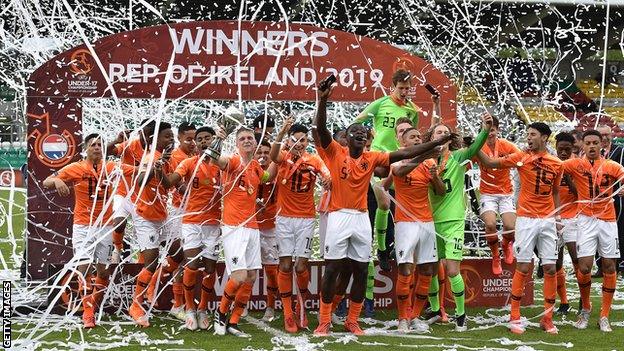
Netherlands Under-17s beat Italy in the European Championship final in May
"How do you cope with normal behaviour and normal society when you are a guy like that? We can't do everything about it, but one of the things we can do is get them in environments, like for instance Bolivia, where many people are very poor and talk about those things."
Koeman works in the same office as the youth-team coaches, keeping a keen eye on young prospects who hope to add their name to a wall at the campus entrance displaying those of every man and woman to have represented the Netherlands.
Last year, Justin Kluivert - the 20-year-old Roma forward and son of former Netherlands striker Patrick - was handed his senior debut in a 3-0 friendly win against Portugal after impressing for the Under-19s and Under-23s.
Koeman is hoping to find more young stars to improve his senior side.
"We have a good team, a good balance between young players and more experienced players," he says.
"We have good defenders, enough good midfielders, the offensive side is a little bit minimum in our choices and we know that - hopefully the boys from the Under-17s come through the system."
Some of that successful Under-17 team have already made moves abroad. Ki-Jana Hoever joined Liverpool from Ajax last year, while fellow defender Ian Maatsen swapped PSV for Chelsea.
"I was 26 when I moved to Barcelona and now they move at 19 or even younger," says Koeman.
"We know in Holland it is difficult to keep them because the level of the competition is not the strongest and to be a better, stronger player you need to make a transfer.
"When I speak to the boys in the national team and they ask 'what is best for me?' I tell them it is the best club but you need to play, you need regular game time, you need that to improve."


De Jong, De Ligt and Daley Blind in Dutch national team training
Ajax's success this season - winning a first league title in five years and coming within seconds of reaching the Champions League final - has been a huge positive for Dutch football, not least because academy graduates such as De Ligt and Donny van de Beek are regulars in the first-team squad, while eight of the club's youngsters were part of Netherlands' Under-17s winning contingent.
"The core we have is the development of players and talents. Giving the opportunity, it doesn't matter how young you are," Ajax chief executive Edwin van der Sar tells BBC Sport.
"If you are good enough then you play. Giving opportunities, giving possibilities, that is what this club is about."
Van der Sar uses an old picture of De Ligt he found from before his 2011 testimonial as an example. Aged 11, he was lining up in a youth side against Van der Sar's son, who was representing Manchester United.
"That was eight years ago," adds the former Ajax, Juventus and United goalkeeper.
"He has been at the academy, he has seen others training at the same complex, eating at the same table. And now he is 19, he is the captain. Other players see him as an example and want to be like him."
De Ligt is perhaps the most successful case study for Ajax's 'Plan Cruyff', a strategy written and implemented by former head of talent development Ruben Jongkind. It led to the rebuilding of the club after Johan Cruyff returned to the board in 2011 and was nicknamed the 'Velvet Revolution'.
It stated Ajax should play attractive, attacking football, and that at least half the first team should be home-grown players. Jongkind studied other sports as he set about reforming everything from catering in the youth academy to the club's medical department, also creating a methodology department aimed at designing plans for individual players.
"The club's vision was to give dreams and chances to young people and inspire the world with attractive football," he says.
Now the KNVB is talking with Jongkind to see what parts of the plan might benefit them.
"At the moment we are looking at rebuilding the coaching academy and looking for some connections with the Cruyff legacy," says Langeler.
"Johan Cruyff was the example of how the Dutch players want to be. He was always wondering, always curious and always doing something, things that you didn't expect. As a player as well as a coach.
"There are some differences in the way the Cruyff legacy has taken place and the way we want to do it."
Koeman learned his own coaching lessons from Cruyff as a player, firstly at Ajax and then as part of the Barcelona 'Dream Team' of the early 1990s.
"Cruyff said to me 'sometimes you need to play in the middle yourself, because then they can see and learn from you'," he says.
"He said if you are sometimes involved in sessions yourself you see much more, and you also hear more if they have good communications."
If the Netherlands are to become the first winners of the Nations League this weekend then Koeman may well remember the advice he was given by the country's most iconic football figure, though the current national team manager is looking at the bigger picture.
"Everybody will say 'Look, Holland is back on track'," he says. "We are proud because we had a bad time over the last four or five years with the national team.
"The goal now is to qualify for the Euros, and if you play in the Euros you like to win the Euros."
Much has been achieved already, but do that, and Koeman might even get his statue.